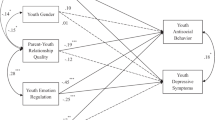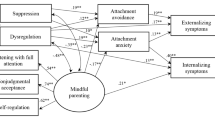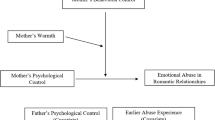Abstract
This study tested associations between problems in parent-youth relationships and problems with alcohol use among college students (N = 1592) using structural equation modeling. Hypotheses were that relationships between both substance-specific parenting factors (parental drinking) and non-substance-specific parenting factors (parental intrusive control and lack of support) and college student drinking behaviors would be mediated by the developmental tasks of managing difficult emotions and establishing a mature psychosocial identity. Sex, ethnicity and age were entered as control variables in the analyses and were tested for moderating effects. Results showed that the unconstrained model for males and females differed significantly from a model in which the two groups were constrained to be similar. Among young women, emotion regulation and psychosocial maturity were partial mediators of the effects of parent problems on alcohol use problems. Among young men, parent problems were indirectly related to alcohol use problems through emotion regulation. Implications for alcohol use prevention activities on college campuses are discussed.



Similar content being viewed by others
References
Adalbjarnardottir S (2002) Adolescent psychosocial maturity and alcohol use: Quantitative and qualitative analysis of longitudinal data. Adolesc 37:19–53
Adalbjarnardottir S, Hafsteinsson LG (2001) Adolescents perceived parenting styles and their substance use: Concurrent and longitudinal analyses. J Res Adolesc 11:401–423
Armsden GC, Greenberg MT (1987) The Inventory of Parent and Peer Attachment: Individual differences and their relationship to psychological well-being in adolescence. J Youth Adolesc 16(5):427–454
Balistreri E, Busch-Rossnagel NA, Geisinger KF (1995) Development and preliminary validation of the ego identity process questionnaire. J Adolesc 18:179–192
Barber BK (1996) Parental psychological control: Revisiting a neglected construct. Child Dev 67:3296–3319
Barber BK, Harmon EL (2002) Violating the self: Parental psychological control of children and adolescents. In: Barber BK (ed) Intrusive parenting: How psychological control affects children and adolescents. American Psychological Association, Washington, D C, pp 15–52
Barnow S, Schuckit MA, Lucht M, John U, Freyberger HJ (2002) The importance of a positive family history of alcoholism, parental rejection and emotional warmth, behavioral problems and peer substance use for alcohol problems in teenagers: A path analysis. J Stud Alcohol 63:305–315
Baron R, Kenny D (1986) The moderator-mediator variable distinction in social psychological research: conceptual, strategic, and statistical considerations. J Pers Soc Psychol 51:1173–1182
Bell NJ, Forthun LF, Sun SW (2000) Attachment, adolescent competencies, and substance use: Developmental considerations in the study of risk behaviors. Subst Use Misuse 35(9):1177–1206
Bishop DI, Macy-Lewis JA, Schnekloth CA, Puswella S, Struessel GL (1997) Ego identity status and reported alcohol consumption: A study of first-year college students. J Adolesc 20:209–218
Bray JH, Adams GJ, Getz JG, Baer PE (2001) Developmental, family, and ethnic influences on adolescent alcohol usage: A growth curve approach. J Fam Psychol 15:3001–3314
Bray JH, Adams GJ, Getz JG, McQueen A (2003) Individuation, peers, and adolescent alcohol use: A latent growth analysis. J Consult Clin Psychol 71:553–564
Bijttebier P, Goethals E, Ansoms S (2006) Parental drinking as a risk factor for children’s maladjustment: The mediating role of family environment. Psychol Addict Behav 20:126–130
Browne MW, Cudeck R (1993) Alternative ways of assessing model fit. In: Bollen KA, Long JS (eds) Testing structural equation models. Sage, Newbury Park, CA, pp 136–162
Byrne BM (1994) Testing for factorial validity, replication, and invariance of a measuring instrument: A paradigmatic application based on the Maslach Burnout Inventory. Mult Behav Res 29:289–311
Campos JJ, Mumme DL, Kermoian R, Campos RG (1994) The development of emotion regulation: Biological and behavioral considerations. Monogr Soc Res Child Dev 59:284–303
Catanzaro SJ, Laurent J (2004) Perceived family support, negative mood regulation expectancies, coping, and adolescent alcohol use: Evidence of mediation and moderation effects. Addict Behav 29:1779–1797
Chickering AW, Reisser L (1993) Education and identity (2nd edn). Jossey-Bass Publishers, San Francisco
Clements R (1999) Prevalence of alcohol-use disorders and alcohol-related problems in a college student sample. Journal of American College Health 48:111–118
Cloninger CR, Sigvardsson S, Przybeck TR, Svrakic DM (1995) Personality antecedents of alcoholism in a national area probability sample. European Arch Psych Clin Neurosc 245:239–244
Coffelt NL, Forehand R, Olson AL, Jones DJ, Gaffney CA, Zens MS (2006) A longitudinal examination of the link between parent alcohol problems and youth drinking: The moderating roles of parent and child gender. Addict Behav 31:593–605
Cooper ML, Frone MR, Russell M, Mudar P (1995) Drinking to regulate positive and negative emotions: A motivational model of alcohol use. J Pers Soc Psychol 69:990–1005
Curran PJ, Stice E, Chassin L (1997) The relation between adolescent alcohol use and peer alcohol use: A longitudinal random coefficients model. J Consult Clin Psychol 65:130–140
DeJong W, Langford LM (2002) A typology for campus-based alcohol prevention: Moving toward environmental management strategies. J Stud Alcohol 14:140–147
DeLucia C, Belz A, Chassin L (2001) Do adolescent symptomatology and family environment vary over time with fluctuations in paternal alcohol impairment? Dev Psychol 37:207–216
Dishion TJ, McMahon RJ (1998) Parental monitoring and the prevention of child and adolescent problem behavior: a conceptual and empirical formulation. Clin Child Fam Psychol Rev 1:61–75
Erikson E (1968) Identity: Youth and crisis. Norton, NY
Fischer JL, Wampler RS (1994) Abusive drinking in young adults: Personality type and family role as moderators of family-of-origin influences. J Marr Fam 56:469–479
Fullinwider-Bush N, Jacobvitz DB (1993) The transition to young adulthood: Generational boundary dissolution and female identity development. Fam Process 32:87–103
Gross JJ (1998) The emerging field of emotion regulation: An integrative review. Rev Gen Psychol 2:271–299
Grotevant HD, Cooper CR (1985) Patterns of interaction in family relationships and the development of identity exploration in adolescence. Child Dev 56:415–428
Ham LS, Hope DA (2003) College students and problematic drinking: A review of the literature. Clin Psychol Rev 23:719–759
Hodgins DC, Shimp L (1995) Identifying adult children of alcoholics: Methodological review and a comparison of the CAST-6 with other methods. Addiction 90:255–267
Holmbeck GN (1997) Toward terminological, conceptual, and statistical clarity in the study of mediators and moderators: Examples from the child-clinical and pediatric psychology literatures. J Consult Clin Psychol 65:599–610
Hood AB (1997) The Iowa student development inventories (2nd edn). HiTech Press, The University of Iowa
Hu L, Bentler PM (2000) Cutoff criteria for fit indexes in covariance structure analysis: Conventional criteria versus new alternatives. Struct Eqn Model 6:1–55
Iacono WG, Carlson SR, Taylor J, Elkins IJ, McGue M (1999) Behavioral disinhibition and the development of substance-use disorders: Findings from the Minnesota twin family study. Dev Psychopathol 11:869–900
Jacob T, Johnson S (1997) Parenting influences on the development of alcohol abuse and dependence. Alcohol Health Res World 21:204–210
Johnstone BM (1994) Sociodemographic, environmental, and cultural influences on adolescent drinking behavior. In: Zucker R, Boyd G, Howard J (eds) The development of alcohol problems: Exploring the biopsychosocial matrix of risk (NIH Publication No. 94-3495). US Department of Health and Human Services, Rockville, MD, pp 169–203
Jones JW (1983) The children of alcoholics screening test: A validity study. Bull Soc Psychol Addict Behav 2:155–163
Jones RM, Hartmann BR (1988) Ego identity: Developmental differences and experimental substance use among adolescents. J Adolesc 11:347–360
Kandel DB, Andrews K (1987) Processes of adolescent socialization by parents and peers. Int J Addict 22:319–342
Kassel JD, Jackson SI, Unrod M (2000) Generalized expectancies for negative mood regulation and problem drinking among college students. J Stud Alcohol 61:332–340
Larimer ME, Cronce JM (2002) Identification, prevention and treatment: A review of individually-focused strategies to reduce problematic alcohol consumption by college students. J Stud Alcohol 14:148–163
Lei M, Lomax RG (2005) The effect of varying degrees of nonnormality in structural equation modeling. Struct Eqn Model 12:1–27
Markstrom CA, Sabino VM, Turnder BJ, Berman RC (1997) The psychosocial inventory of ego strengths: Development and validation of a new Eriksonian measure. J Youth Adolesc 26:705–732
McDonald RP, Ho M-HR (2002) Principles and practice in reporting structural equation analyses. Psychol Methods 7:64–82
Nolen-Hoeksema S (2004) Gender differences in risk factors and consequences for alcohol use and problems. Clin Psychol Rev 24:981–1010
Nurmi J, Berzonsky MD, Tammi K, Kinney A (1997) Identity processing orientation, cognitive and behavioural strategies and well-being. Int J Behav Dev 21:555–570
Pandina RJ, Johnson V (1990) Serious alcohol and drug problems among adolescents with a family history of alcoholism. J Stud Alcohol 51:278–282
Park CL, Levenson MR (2002) Drinking to cope among college students: Prevalence, problems, and coping processes. J Stud Alcohol 63:486–497
Patock-Peckham JA, Morgan-Lopez AA (2006) College drinking behaviors: Mediational links between parenting styles, impulse control, and alcohol-related outcomes. Psychol Addict Behav 20:117–125
Perkins HW (2002) Social norms and the prevention of alcohol misuse in collegiate contexts. J Stud Alcohol 14:164–172
Perosa LM, Perosa SL, Tam HP (1996) The contribution of family structure and differentiation to identity development in females. J Youth Adolesc 25:817–837
Pidcock BW, Fischer JL, Forthun LF, West SL (2000) Hispanic and Anglo college women’s risk factors for substance abuse and eating disorders. Addict Behav 25:705–723
Preacher KJ, Hayes AF (2004) SPSS and SAS procedures for estimating indirect effects in simple mediation models. Behav Res Methods, Instrum, Comput 36:717–731
Simmons-Morton B, Chen R (2005) Latent growth curve analyses of parent influences on drinking progression among early adolescents. J Stud Alcohol 66:5–13
Sivo SA, Fan X, Witta EL, Willse JT (2006) The search for “optimal” cutoff properties: Fit index criteria in structural equation modeling. J Exp Educ 74:267–288
Stone G, Buehler G, Barber BK (2002) Interparental conflict, parental psychological control, and youth problem behavior. In: Barber BK (ed) Intrusive parenting: How psychological control affects children and adolescents. American Psychological Association, Washington, DC, pp 53–95
Strayer J (2002) The dynamics of emotions and life cycle identity. Identity: Int J Theory Res 2:47–79
Walitzer KS, Sher KJ (1996) A prospective study of self-esteem and alcohol use disorders in early adulthood: Evidence for gender differences. Alcoholism: Clin Exp Res 20:1118–1124
Wampler R, Fischer J, Thomas M, Lyness K (1993) Young adult offspring and their families of origin: Cohesion, adaptability, and addiction. J Subst Abuse 5:195–201
Wechsler H, Davenport A, Dowdall G, Moeykens B, Castillo S (1994) Health and behavioral consequences of binge drinking in college: A national survey of students at 140 campuses. J Am Med Assoc 272:1672–1677
Wechsler H, Lee JE, Kuo M, Lee H (2000) College binge drinking in the 1990s: A continuing problem. J Am Coll Health 48:199–210
Wills TA, Dishion TJ (2004) Temperament and adolescent substance use: A transactional analysis of emerging self-control. J Clin Child Adolesc Psychol 33:69–81
Wills TA, Resko JA, Ainette MG, Mendoza D (2004) Role of parent support and peer support in adolescent substance use: A test of mediated effects. Psychol Addict Behav 18:122–134
Windle M, Davies PT (1999) Depression and heavy alcohol use among adolescents: Concurrent and prospective relations. Dev Psychopathol 11:823–844
Zucker RA, Fitzgerald HE, Refior SK, Pallas DM, Ellis DA (2000) The clinical and social ecology of childhood for children of alcoholics: Description of a study and implications for a differentiated social policy. In: Fitzgerald HE, Lester BM, Zuckerman BS (eds) Children of addiction: Research, health, and policy issues. Routledge/Falmer Press, New York, pp 109–141
Author information
Authors and Affiliations
Corresponding author
Additional information
Research interests in college student alcohol misuse.
Research interests in adolescent psychosocial maturity.
Research interests in young adult relationships.
Rights and permissions
About this article
Cite this article
Fischer, J.L., Forthun, L.F., Pidcock, B.W. et al. Parent Relationships, Emotion Regulation, Psychosocial Maturity and College Student Alcohol Use Problems. J Youth Adolescence 36, 912–926 (2007). https://doi.org/10.1007/s10964-006-9126-6
Received:
Accepted:
Published:
Issue Date:
DOI: https://doi.org/10.1007/s10964-006-9126-6




